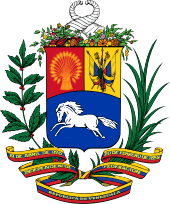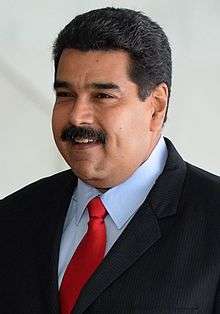President of Venezuela
| President of Venezuela | |
|---|---|
|
| |
| Style |
Mr. President Señor Presidente |
| Member of | Cabinet |
| Residence | La Casona |
| Seat | Miraflores Palace, Caracas |
| Term length | Six years, renewable indefinitely |
| Inaugural holder |
Cristóbal Mendoza (First Republic) José Antonio Páez (State of Venezuela) |
| Formation | January 13, 1830 |
| Deputy | Vice President of Venezuela |
| Website | presidencia.gob.ve |
 |
| This article is part of a series on the politics and government of Venezuela |
|
Executive |
|
Legislature |
|
Judiciary |
| Foreign relations |
The President of Venezuela, officially known as the President of the Bolivarian Republic of Venezuela (Spanish: Presidente de la República Bolivariana de Venezuela) and also commonly called President of the Republic is the elected head of state and head of government in Venezuela's presidential system. The president leads the National Executive of the Venezuelan government and is the commander-in-chief of the National Bolivarian Armed Forces. Presidential terms were set at six years in with the adoption of the 1999 constitution, and re-election has been unlimited since 2009.[1]
The office of President has existed since 1811, when Venezuela declared independence from the Spanish Crown; the first president was Cristóbal Mendoza. From 1821 to 1830, Venezuela was a member state of Gran Colombia, and the Venezuelan executive was absorbed by the Colombian government in Bogotá. When the State of Venezuela became independent from the union, the office of the president was restored under José Antonio Páez. Every head of state of Venezuela since then has held the title of President.
Nicolás Maduro Moros of the United Socialist Party of Venezuela has been President of Venezuela since 6 March 2013, having entered the office as acting president and then being elected at the 2013 presidential election.
Powers
As a republic with a presidential executive, Venezuela grants significant powers to the president. He or she effectively controls the executive branch, represents the country abroad, and appoints the cabinet and, with the approval of the National Assembly, the judges for the Supreme Tribunal of Justice. The president is also the commander-in-chief of the National Bolivarian Armed Forces (FANB).
The powers and obligations of the President of Venezuela are established, limited and numbered by articles 236 and 237 of the constitution:
- To comply with and enforce the Constitution and the law.
- To direct the activity of the Government.
- To appoint and remove the Executive Vice-President and the Cabinet Ministers.
- To direct the international relations of the Republic and sign and ratify international treaties, agreements or conventions.
- To direct the National Armed Forces in his capacity as Commander-in-Chief, exercise supreme hierarchical Authority over the same and establish their contingent.
- To exercise supreme command over the National Armed Forces, promote their officers at the rank of colonel or naval captain and above, and appoint them to the positions exclusively reserved to them.
- To declare states of exception and order the restriction of guarantees in the cases provided for under the Constitution.
- To issue executive orders having the force of law, subject to authorization in advance by an enabling act.
- To call special sessions of the National Assembly.
- To issue regulations for the application of laws, in whole or in part, without altering the spirit, purpose and reason for being of the laws.
- To administer the National Public Treasury.
- To negotiate national loans.
- To order extraordinary budget item in addition to the budget, subject to authorization in advance from the National Assembly or the Delegated Committee.
- To enter into contracts in the national interest, subject to this Constitution and applicable laws.
- To designate, subject to prior authorization from the National Assembly or the Delegated Committee, the Attorney-General of the Republic and the heads of the permanent diplomatic missions.
- To designate and remove those officials whose appointment is made subject to his discretion by the Constitution or the applicable law.
- To address reports or special messages to the National Assembly, either in person or through the Executive Vice-President.
- To formulate the National Development Plan and, subject to approval in advance from the National Assembly, direct the implementation of the same.
- To grant pardons.
- To determine the number, organization and competence of the Ministries and other organs comprising the National Public Administrative Branch, as well as the organization and functions of the Cabinet Ministers, within the principles and guidelines set forth in the pertinent organic law.
- To dissolve the National Assembly in the case contemplated by the Constitution.
- To call reference in the cases provided for under the present Constitution.
- To call and preside over meetings of the National Defense Council.
- Any others vested in the President under the Constitution and law.
Complements and compensations
The President's salary directly derives from the National Treasury, as stated in the Organic Law of Salaries, Pensions and Retirements of High Officials of the Public Power. During his or her tenure, the President may not be employed by anyone else, nor receive any other salary from the state. The President's salary is not to be superior to twelve monthly minimum wages,[2] that is to say, 67,469.76 VEF (as of February 2015).[3]
The Presidential Honor Guard Brigade of Venezuela is in charge of the President's protection, as well as the presidential family and their political peers. The Presidential Guard of Honor is made up of members from the four service branches of the National Bolivarian Armed Forces and other institutions of public security, and is headed by a general or flag officer.
Since 1900, the official workplace of the President is the Palace of Miraflores in Caracas. The presidential residence has been the palace of La Casona since 1964, instituted by president Raúl Leoni. La Casona has not been used by incumbent President Maduro, who has decided not to inhabit it.[4]
- Presidential Palaces

History

The presidential designation encompasses only those persons who were sworn into office as President of Venezuela following Venezuela's declaration of independence from Spanish colonial rule, which took effect on July 5, 1811. The first president, taking office on July 5, 1811, was actually the president of a triumvirate of the first established Republic of Venezuela that rotated the presidency weekly. The person serving as president during the week of July 5 was one of the three signatories of the Declaration of Independence: Cristóbal Mendoza. Mendoza shared the triumvirate with Juan Escalona and Baltasar Padrón. A second triumvirate followed on April 3, 1812 whose members were Francisco Espejo, Fernando Toro and Francisco Javier Ustariz.[5][6]
Owing to the profound confusion of the Venezuelan War of Independence and the period of Gran Colombia over what is now Venezuela, this page has gaps between 1813 and 1819. For this period in time, historians refer to the Republic of Venezuela as the Second Republic of Venezuela (1813–1814) and the Third Republic of Venezuela (1817–1819) as Simon Bolivar twice reestablished the republic. The Congress of Angostura appointed Simón Bolívar "Jefe Supremo de la República de Venezuela" (Supreme Commander of the Republic of Venezuela) from 1819 until 1830.
In 1830, José Antonio Páez declared Venezuela independent from Gran Colombia and became president, taking office on January 13, 1830. Although he was not the first president of Venezuela (having in mind Cristóbal Mendoza in 1811), he was the first head of state of independent Venezuela, after the dissolution of Gran Colombia. From that point on, five constitutions were adopted, all slightly changing the extent of the President's powers and responsibilities.
Requirements
According to articles 227 and 229 of the Constitution of Venezuela, adopted in 1999, the following requirements must be met in order to become President of the Republic:[7]
- Being a Venezuelan citizen from birth and possessing no other nationality.
- Being at least 30 years old at the time of the election.
- Not being a subject to any conviction by final judgment
- Not being a Minister, Governor, Mayor or the Vice President of the Republic from the day the candidacy is announced to the day of the election.
Term limits
The current presidential term is for six years with the constitutionally guaranteed recourse of holding a popular recall referendum any time within the last three years of a presidential term. A 2009 referendum removed the previous restrictions which limited the President to two terms.[1]
Previously, the presidential term was set at five years. A sitting president was not only barred from immediate reelection, but could not run again for 10 years (equivalent to two full terms) after leaving office.
Recall
The president may be recalled after a specific time in office.
Office-holders
Presidents of Venezuela who served under the 1864 constitution (starting with Juan Crisóstomo Falcón) bore the title of "President of the Union", instead of the usual "President of the Republic" still used today. Aside from that, all heads of state of the country since 1811 have held the title of "President of Venezuela", with minor variations regarding the official name of the country (which has changed four times since the restoration of the independence in 1830).
- Living former presidents



Last election
| Candidate | Party | Coalition | Votes | % | |
|---|---|---|---|---|---|
| Nicolás Maduro | United Socialist Party | GPP | 7,587,579 | 50.61 | |
| Henrique Capriles Radonski | Justice First | MUD | 7,363,980 | 49.12 | |
| Eusebio Mendez | New Vision for my Country | N/A | 19,498 | 0.13 | |
| María Bolívar | United Democratic Party for Peace and Freedom | 13,309 | 0.08 | ||
| Reina Sequera | Worker's Party | 4,241 | 0.02 | ||
| Julio Mora | Democratic Unity Party | 1,936 | 0.01 | ||
| Valid votes | 14,990,543 | 99.55 | |||
| Invalid/blank votes | 66,937 | 0.44 | |||
| Total | 15,059,630 | 100 | |||
| Registered voters | 18,904,364 | 79.68 | |||
| Source: Consejo Nacional Electoral | |||||
See also
- List of Presidents of Venezuela
- List of Vice Presidents of Venezuela
- History of Venezuela
- Politics of Venezuela
References
- 1 2 "Chavez wins chance of fresh term". BBC News Online (in Spanish). Caracas. 16 February 2009. Retrieved 2 January 2016.
- ↑ "Ley Orgánica de Emolumentos, Pensiones y Jubilaciones de los Altos Funcionarios del Poder Público" (PDF). Official Gazette of the Bolivarian Republic of Venezuela (in Spanish). Caracas. 12 January 2011. Retrieved 3 January 2016.
- ↑ "Oficializan aumento de 15% del salario mínimo". El Universal (in Spanish). Caracas. 9 February 2015. Retrieved 3 January 2016.
- ↑ "Presidente Maduro aclaró rumores sobre presencia de familia Chávez en La Casona". Noticias Candela (in Spanish). 6 December 2013. Retrieved 3 January 2016.
- ↑ (Spanish) "Presidentes de Venezuela". Consulado General de Bucaramanga.
- ↑ Briceño Perozo, Mario. "Mendoza, Cristóbal de" in Diccionario de Historia de Venezuela, Vol. 3. Caracas: Fundación Polar, 1999. ISBN 978-980-6397-37-8.
- ↑ Constitution of the Bolivarian Republic of Venezuela, Chapter 11 – National Executive Power
External links
- Official website of the Presidency of Venezuela (Spanish)
- Official website of the Venezuelan Government (Spanish)


